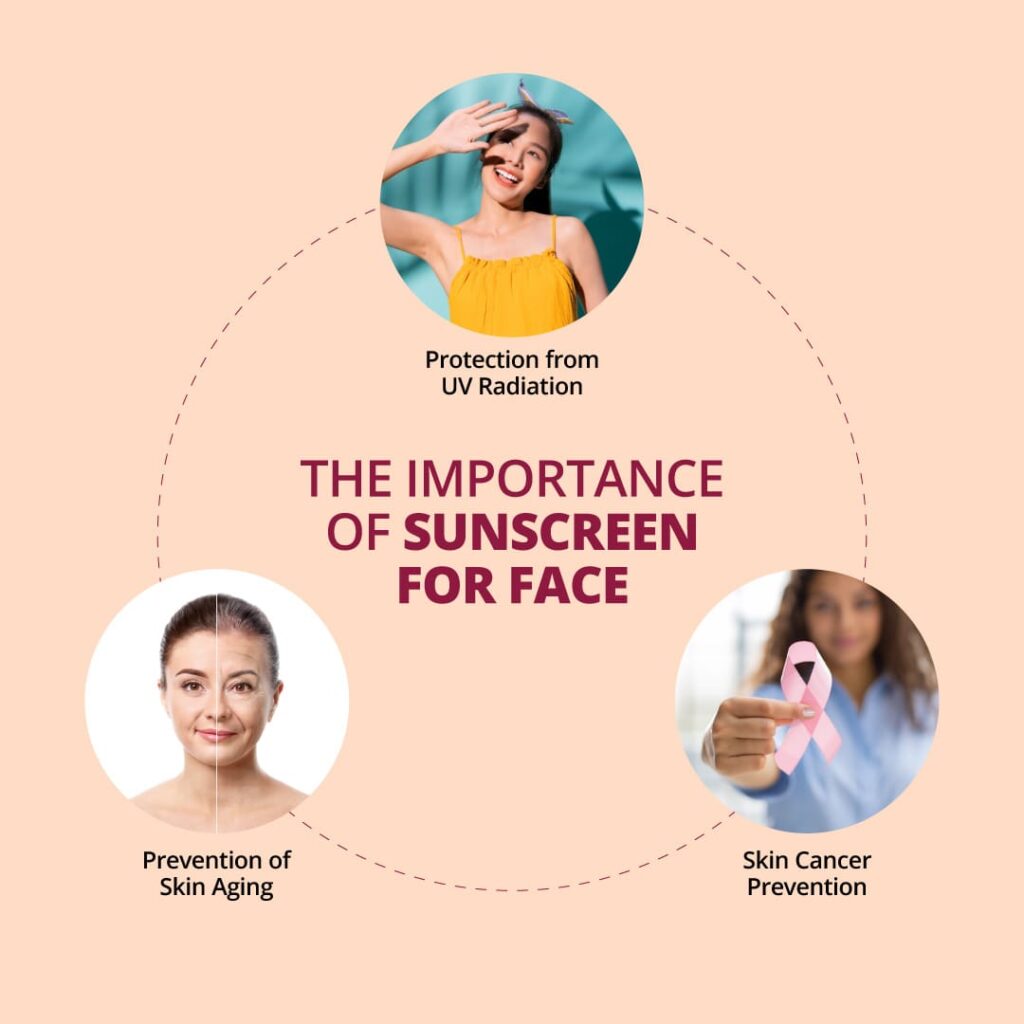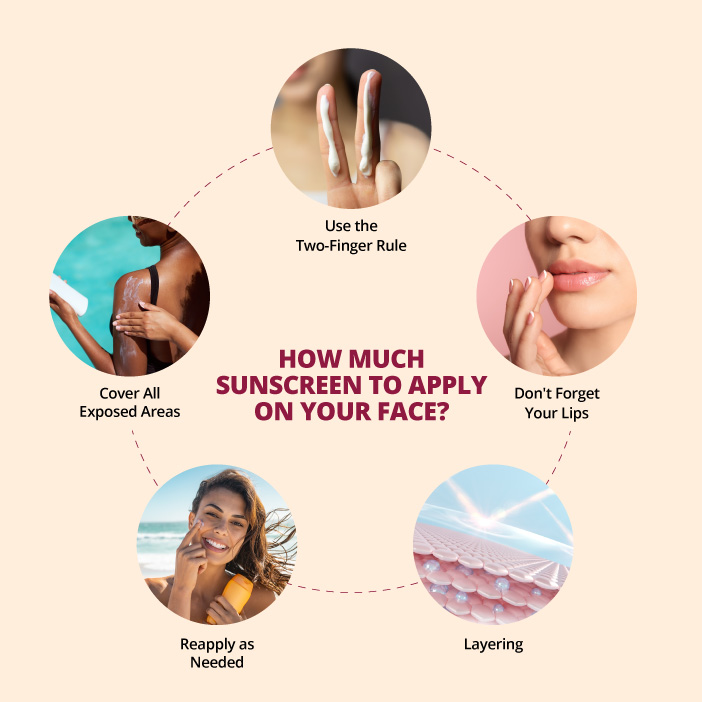Protecting your skin from the harmful effects of the sun is crucial for maintaining healthy, youthful-looking skin and preventing skin cancer. While most people understand the importance of using sunscreen, many still struggle with a common question: how much sunscreen to apply on face? In this comprehensive guide, we will delve into the dos and don’ts of sunscreen application for your face, explore the different types of sunscreen creams available, and help you choose the best sunscreen for your specific needs.
The Importance of Sunscreen for Face

Before we dive into the specifics of how much sunscreen to apply, let’s first understand why sunscreen for the face is so important.
Protection from UV Radiation
The sun emits harmful ultraviolet (UV) radiation, including UVA and UVB rays, which can damage the skin and lead to premature aging, sunburn, and an increased risk of skin cancer. Sunscreen acts as a shield, blocking or absorbing these harmful rays.
Prevention of Skin Aging
Sun exposure is a major contributor to premature skin aging, causing wrinkles, fine lines, and age spots. Using sunscreen regularly can help maintain youthful and healthy-looking skin.
Skin Cancer Prevention
Skin cancer, including melanoma, is one of the most common types of cancer worldwide. Applying sunscreen cream for your face is a simple yet effective measure to reduce your risk of developing skin cancer.
Now that we understand the importance of sunscreen cream for the face, let’s explore the specifics of its application.
How Much Sunscreen to Apply on Your Face?

The amount of sunscreen you should apply on your face depends on several factors, including your skin type, the type of sunscreen product you’re using, and your intended sun exposure.
Here’s a general guideline:
Use the Two-Finger Rule
A common rule of thumb is to use a nickel-sized amount or about two finger lengths of sunscreen for your face. This should provide adequate coverage to protect your skin.
Cover All Exposed Areas
Ensure that you cover all exposed areas of your face, including your forehead, nose, cheeks, chin, and neck. Many people tend to overlook the neck, which is susceptible to sun damage.
Reapply as Needed
Sunscreen effectiveness diminishes over time, especially if you sweat or swim. Reapply sunscreen every two hours or more frequently if you’re sweating or in the water.
Layering: Moisturizer and Sunscreen
If you use a separate moisturizer, apply it first, and then follow it with sunscreen. Make sure to wait a few minutes between applying products to allow proper absorption.
Don’t Forget Your Lips
Your lips are also susceptible to sun damage. Use a lip balm or lipstick with SPF protection to keep them safe.
Choosing the Right Sunscreen Cream for Face
The sunscreen market is flooded with options, making it challenging to choose the best one for your face. Here are some factors to consider when selecting a sunscreen cream for face:
Broad-Spectrum Protection
Look for a sunscreen labeled “broad-spectrum,” as it will protect against both UVA and UVB rays. UVB rays cause sunburn, while UVA rays contribute to premature aging and skin cancer.
SPF Level
The Sun Protection Factor (SPF) indicates the level of protection a sunscreen offers against UVB rays. For daily use, an SPF of 30 is generally sufficient. However, if you spend extended periods outdoors, opt for SPF 50 or higher.
Skin Type
Consider your skin type when choosing a sunscreen. If you have oily or acne-prone skin, go for a non-comedogenic, oil-free sunscreen. For sensitive skin, select a sunscreen with hypoallergenic and fragrance-free options.
Water-resistant
If you’ll be sweating or swimming, choose a water-resistant sunscreen and reapply it more frequently as indicated on the label.
Additional ingredients
Some sunscreens include added ingredients like antioxidants, vitamins, or moisturizers. These can provide additional benefits for your skin but may also increase the price.
Personal Preferences
Sunscreen comes in various forms, such as lotions, creams, gels, and sprays. Choose the texture and application method that you find most comfortable to use consistently.
Which Sunscreen is Best for the Face?
Determining the best sunscreen for your face can be subjective, as it depends on your individual preferences and skin needs. However, here are some top recommendations based on different scenarios:
Everyday Use
If you’re looking for a sunscreen to use on a daily basis, consider lightweight, non-greasy options like Neutrogena Ultra Sheer Dry-Touch Sunscreen SPF 30 or EltaMD UV Clear Broad-Spectrum SPF 46.
Sensitive Skin
For those with sensitive skin, dermatologist-recommended brands like CeraVe Hydrating Mineral Sunscreen SPF 30 or La Roche-Posay Anthelios Melt-in Milk Sunscreen SPF 100 are excellent choices.
Outdoor Activities
If you plan on spending extended periods outdoors, opt for high SPF options like Coppertone Sport Sunscreen Lotion SPF 50 or Banana Boat Ultra Sport Sunscreen Lotion SPF 50+.
Makeup-Friendly
If you wear makeup, look for sunscreens specifically designed for use under makeup, such as EltaMD UV Clear Broad-Spectrum SPF 46 or Supergoop! Unseen Sunscreen SPF 40.
Tips for Effective Sunscreen Application
Applying sunscreen correctly is just as important as choosing which sunscreen is best for face. Here are some tips for effective sunscreen application:
Apply 15 Minutes Before Sun Exposure
To allow the sunscreen to fully bind to your skin, apply it 15 minutes before heading outdoors.
Even Application
Make sure to spread the sunscreen evenly across your face and neck. Don’t forget your ears, as they are often exposed to the sun.
Blend Well
Take the time to blend the sunscreen thoroughly, ensuring there are no streaks or missed spots.
Reapply After Swimming or Sweating
Even water-resistant sunscreen should be reapplied after swimming or heavy sweating.
Use a Mirror
Applying sunscreen in front of a mirror can help you see any areas you may have missed.
Sunscreen for All Seasons
Sunscreen is not just for sunny days. UV rays can penetrate clouds and glass, so use it year-round.
Protect Your Eyes
Consider wearing sunglasses with UV protection to shield your eyes from harmful sun rays.
Properly applying sunscreen on your face is essential for protecting your skin from the sun’s harmful effects. Knowing how much sunscreen to apply and choosing the right product for your needs are key steps in maintaining healthy and youthful-looking skin while reducing the risk of skin cancer. Whether you’re spending a day at the beach or simply going about your daily routine, don’t forget to make sunscreen for your face a non-negotiable part of your skincare regimen. Your skin will thank you for it in the long run.





